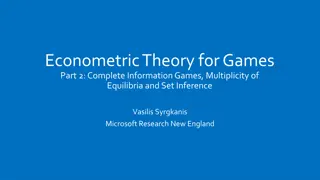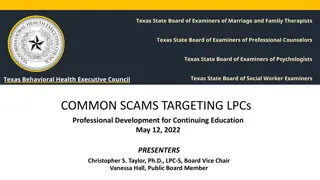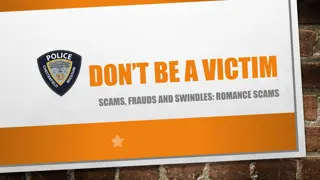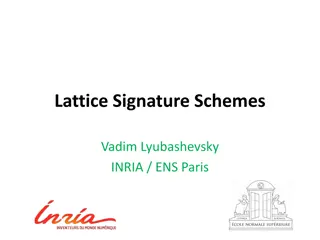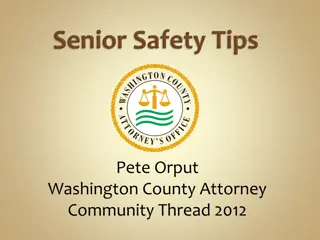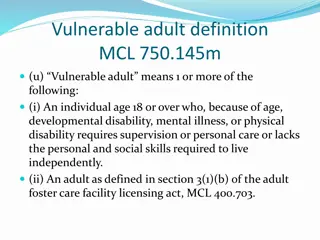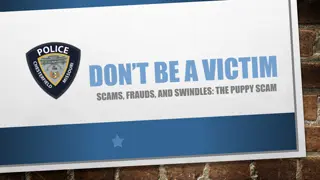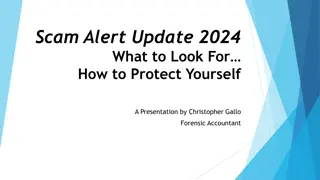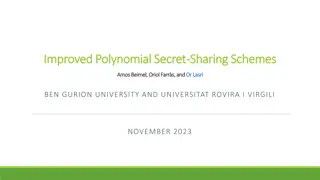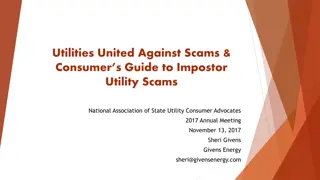Games to Teach about Cybercrimes, Schemes and Scams
This content provides valuable information on teaching about cybercrimes, schemes, and scams through games. It covers topics such as protecting against identity theft, understanding credit, and national standards in financial literacy. Students will learn how individuals and companies attempt to gain money and personal information fraudulently, ways to protect themselves, where to find information on scams, and how to report scams effectively.
Download Presentation

Please find below an Image/Link to download the presentation.
The content on the website is provided AS IS for your information and personal use only. It may not be sold, licensed, or shared on other websites without obtaining consent from the author.If you encounter any issues during the download, it is possible that the publisher has removed the file from their server.
You are allowed to download the files provided on this website for personal or commercial use, subject to the condition that they are used lawfully. All files are the property of their respective owners.
The content on the website is provided AS IS for your information and personal use only. It may not be sold, licensed, or shared on other websites without obtaining consent from the author.
E N D
Presentation Transcript
THIS IS JEOPARDY!: Games to Teach about Cybercrimes, Schemes and Scams Doug Young June 17th, 2021 doug.n.young@gmail.com
EconEdLink Membership You can now access CEE s professional development webinars directly on EconEdLink.org! To receive these new professional development benefits, become an EconEdLink member. As a member, you will now be able to: Automatically receive a professional development certificate via e-mail within 24 hours after viewing any webinar for a minimum of 45 minutes Register for upcoming webinars with a simple one-click process Easily download presentations, lesson plan materials and activities for each webinar Search and view all webinars at your convenience Save webinars to your EconEdLink dashboard for easy access to the event You may access our new Professional Development page here
Professional Development Certificate To earn your professional development certificate for this webinar, you must: Watch a minimum of 45-minutes and you will automatically receive a professional development certificate via e-mail within 24 hours. Accessing resources: You can now easily download presentations, lesson plan materials, and activities for each webinar from EconEdLink.org/professional-development/
National Standards Protecting and Insuring: Loss of assets, wealth, and future opportunities can occur if an individual s personal information is obtained by others through identity theft and then used fraudulently. By managing their personal information and choosing the environment in which it is revealed, individuals can accept, reduce, and insure against the risk of loss due to identity theft. Using Credit: Students will understand that credit allows people to purchase goods and services that they can use today and pay for those goods and services in the future with interest. People choose among that have different costs. Lenders approve or loans based on an evaluation of the expected ability to pay in the future. Higher-risk borrowers are charged higher interest rates; lower-risk borrowers are charged lower interest rates. different credit options deny applications for borrower s past credit history and
Virginia State Standard The personal finance and career opportunities by examining the financial citizenship, including evaluating common forms of credit, savings, investments, contractual agreements, guarantees. student will demonstrate knowledge of responsibilities of purchases, warranties, and
Objectives Students will be able to: List ways individuals and companies attempt to gain money and personal information from others for fraudulent uses. Explain how individuals can protect themselves from identity theft and other scams. Provide suggestions on where to obtain information on scams. Give information on where to report scams.
Agenda What s a Scam and Cybercrime Scam Speak with Formative Assessment Terms, Concepts, and Jargon References Ways to use Jeopardy in class, for hybrid classes or students out of class Customizing the Jeopardy Template for your personal teaching Tool Kit Summative Assessments
What makes a scam a Scam? As you watch this video, what makes this a scam? https://www.youtube.com/watch?v=i4nCy6Xs6R8 How are the scammers attempting to obtain information and money? When and how do scams occur? How will you know if you have been a victim of a scam? FFFL, Lesson 19 Lesson 19.1 - Don t be scammed! https://www.econedlink.org/resources/dont-be-scammed/ Read each of the scenarios presented and decide which are examples of a scam and which are not. Then list the clues that made you think that a scenario was a scam.
Cyber/Scam Speak Banking/Overpayment Brute Force Catfish Charity Fraud Child Identity Theft Credit Repair Scheme Dating/Romance Drive-by Download Identity Freezes Ghosting Grandkid Hash Busters Home Repair I.D. Theft (Driver s License) etc. IRS Imposter Keylogger Lottery/Sweepstake Malware/Malvertising Man-in-the-middle attack Money mule Online Shopping Theft Payday Loans Pharming Phishing Ransomware Rent to Own Scareware Skimming Smishing Social Security Theft Spear-phishing Spoofing Spyware Synthetic Identity Theft Ticket (Super Bowl, etc.) Vishing You ve Won Whaling
Scam Speak Assessment Have students either individually or in groups or 2-3, pick a scam or cyber crime and have them research the topic answering basic questions we should all ask ourselves. Is this an organization or company you are familiar with (bank, fund, etc.)? Is there a problem or prize (computer virus, etc.)? Are they asking you to act immediately to their offer? Will they provide you with a phone number, address or URL? Don t provide any personal or financial information? Share you want to check their legitimacy and will be in touch once verified Have them present their findings either digitally, or newsprint. Have them include visuals, charts, graphs or links to websites on topic.
Other Important Terms Federal Trade Commission Deter, Detect, Defend (3 D s) Shredding Experian, Equifax, Trans Union www.annualcreditreport.com Mnemonic Passwords Pyramid Schemes (Ponzi, Madoff, etc.)
References 70+ common online scams used by cyber criminals and fraudsters- https://www.comparitech.com/vpn/avoiding-common-scams-schemes/ Common scams and schemes used by cyber criminals Identity Theft Resource Center - https://www.idtheftcenter.org/ A non-profit organization established to empower and guide victims, business and government to minimize risk and mitigate consumers, he impact of identity compromise and crime Netflix: Spycraft - https://decider.com/show/spycraft/ Spycraft is an 8-part docuseries that examines the different ways countries have spied on each other and gathered intelligence over the decades. Different methods are examined in each episode. ProPublica: What Facebook Knows About You- https://www.propublica.org/article/breaking-the-black-box-what-facebook-knows-about-you How companies are profiling (monetizing) you Basics of Cybercrime- https://study.com/academy/topic/basics-of-cybercrime.html Multiple Videos on Cybercrime- Search on Videos on Cybercrime for Students
Ways to Use Jeopardy The Jeopardy game (and Kahoot) can be used in class in multiple ways, in a hybrid situation or sent to students at home who missed class or are ill. As an introduction, just using the categories to start to create a dialogue with questions about: Personal experiences Fears or other s experiences What do you know and/or should avoid when online? Stories you ve read about Target, Colonial Pipe Line, et al. Take the questions and answers from each category and create Kahoot, an Ed-Tech trivia game. Each category can be used to introduce, or check work they have been doing, on content topics. https://www.econedlink.org/resources/introduction-to-kahoot/ As a review, prior to or as part of a final Summative Assessment.
Plastic Money Cards Managing Money Banking and Saving Credit Scores Debt Investing 100 100 100 100 100 100 200 200 200 200 200 200 300 300 300 300 300 300 400 400 400 400 400 400 500 500 500 500 500 500 FINAL QUESTION
Kahoot Ed-tech Game 1. Scammers pretend to be interested in you. They ask for your e-mail and later ask for financial help to come visit you. A. Lottery Scam D. Banking Scam B. Charity Scam E. Romance Scam C.. Ticket Scam 2. You receive a phone call claiming you won a prize but require a fee to collect it and/or e-mail, address or phone number to contact you. Name the scam. A. Lottery Scam D. Banking Scam B. Charity Scam E. Romance Scam C. Ticket Scam 3. Your are sent a counterfeit check that looks real. Scammer tells you to deposit the check but asks you to refund a portion as they have sent you too much money. Name the scam. A. Lottery Scam D. Banking Scam B. Charity Scam E. Romance Scam C. Ticket Scam 4. A scammer sets up a fake organization, especially after disasters. They ask you to contribute to otheir fund which sounds similar to other well-known organizations. Name the scam. A. Lottery Scam D. Banking Scam B. Charity Scam E. Romance Scam C. Ticket Scam 5. At the Super Bowl scalpers sell tickets which seem to be legitimate as they have a bar codes and logos for the event. For the tickets they ask for cash or a credit card. Name the scam. A. Lottery Scam D. Banking Scam B. Charity Scam E. Romance Scam C. Ticket Scam
Kahoot Ed-tech Game (Answers) 1. Scammers pretend to be interested in you. They ask for your e-mail and later ask for financial help to come visit you. A. Lottery Scam D. Banking Scam B. Charity Scam E. Romance Scam C.. Ticket Scam 2. You receive a phone call claiming you won a prize but require a fee to collect it and/or e-mail, address or phone number to contact you. Name the scam. A. Lottery Scam D. Banking Scam B. Charity Scam E. Romance Scam C. Ticket Scam 3. Your are sent a counterfeit check that looks real. Scammer tells you to deposit the check but asks you to refund a portion as they have sent you too much money. Name the scam. A. Lottery Scam D. Banking Scam B. Charity Scam E. Romance Scam C. Ticket Scam 4. A scammer sets up a fake organization, especially after disasters. They ask you to contribute to otheir fund which sounds similar to other well-known organizations. Name the scam. A. Lottery Scam D. Banking Scam B. Charity Scam E. Romance Scam C. Ticket Scam 5. At the Super Bowl scalpers sell tickets which seem to be legitimate as they have a bar codes and logos for the event. For the tickets they ask for cash or a credit card. Name the scam. A. Lottery Scam D. Banking Scam B. Charity Scam E. Romance Scam C. Ticket Scam
Scam Assessment A local senior citizen center director contacts you. She is concerned that some of its members are not knowledgeable about Identity Theft or scams and may be taken advantage of. She asks you to make a presentation at a local senior center about scams and identity theft. Prepare a 5 to-10 minute visual and written presentation that includes at least two examples of ways people could be scammed. List suggestions learned from your classwork, or personal research about how they can protect themselves from scams. Gives websites where one can find information on a particular scam, and lists whom a person should contact if they think they have been scammed.
Cybercrime Assessment You can simply be doing whatever you usually do online, and without any warning, cybercrime can strike. Choose one of the scenarios below: Your online account is frozen and you need $200 to unlock it. Your Facebook account has been hacked and pictures that weren t on your account suddenly appear. Your savings account has been drained of over $1,000. Or, choose one of the topics from the Scam Speak list: For whichever topic you choose, do in depth research on the cybercrime stating the issue, what happens and how to combat the incident and either: Write an article for your school newspaper about your findings. Prepare a wall poster for outside your classroom for other students. Prepare a Kahoot game on the topic. Do a power point presentation for sharing with the class.
CEE Affiliates https://www.councilforeconed.org/resources/local-affiliates/
Thank You to Our Sponsors!
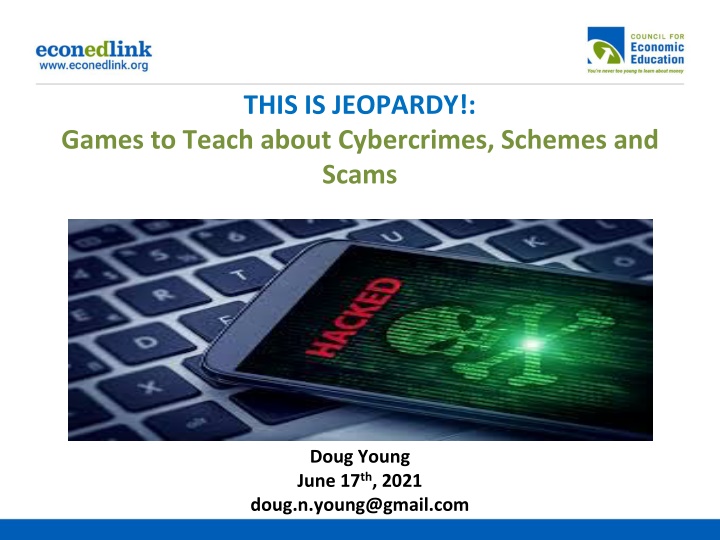

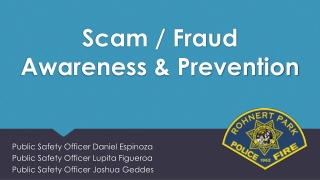
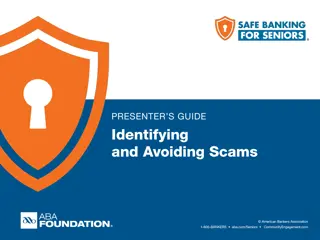
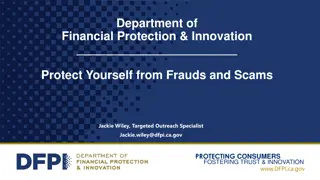
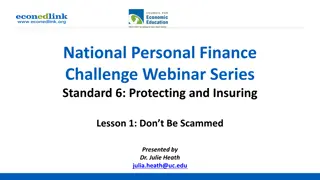
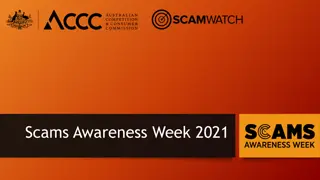
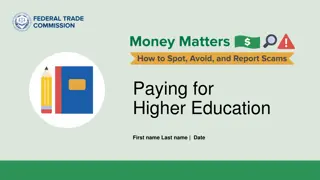
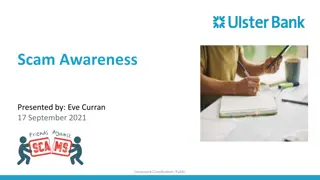
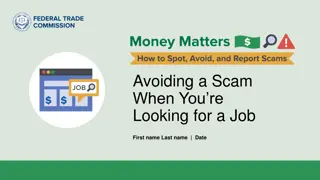
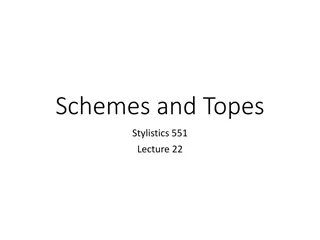
![101 Reviews How to Recover Lost Bitcoin [Scammed/Stolen Funds]](/thumb/153354/101-reviews-how-to-recover-lost-bitcoin-scammed-stolen-funds.jpg)
